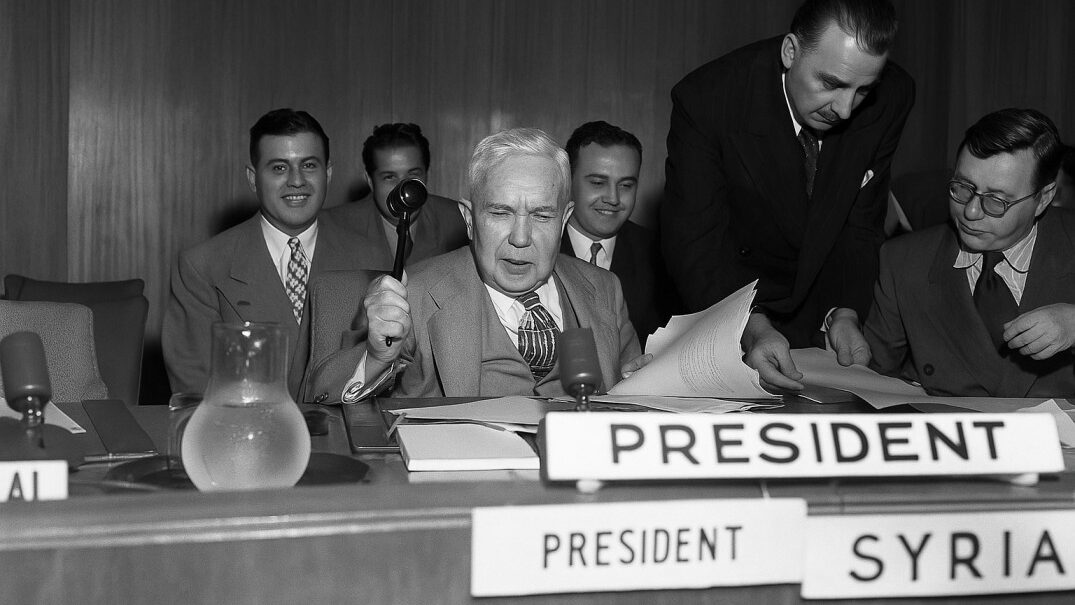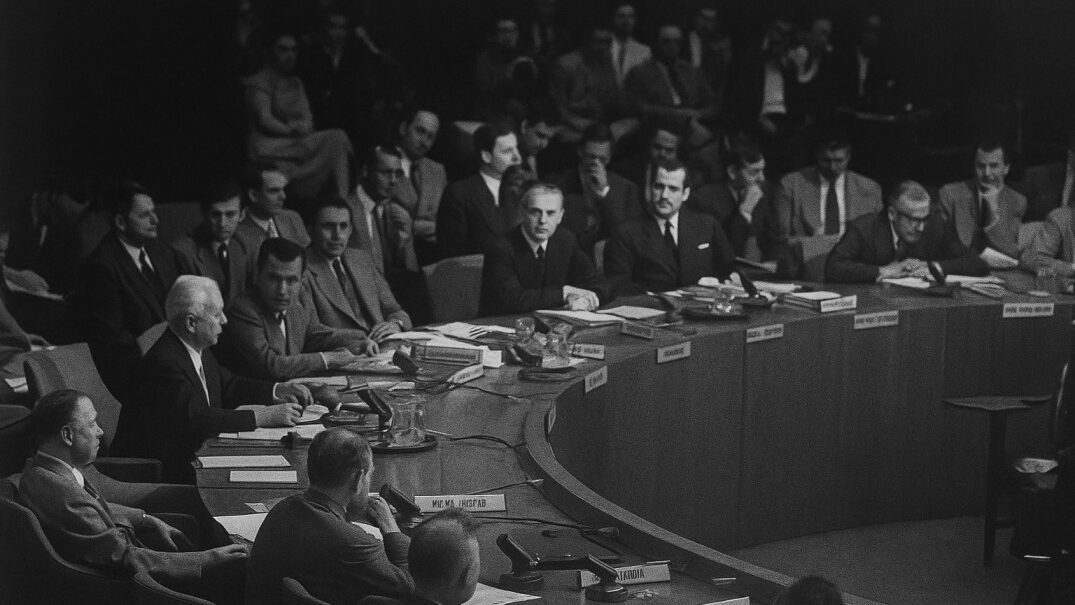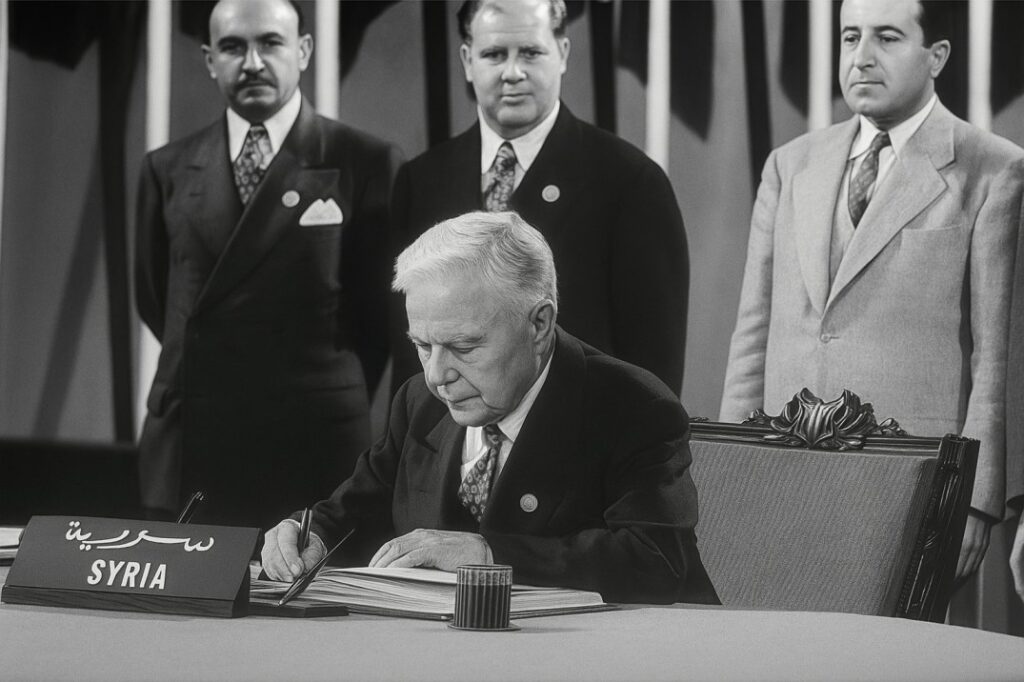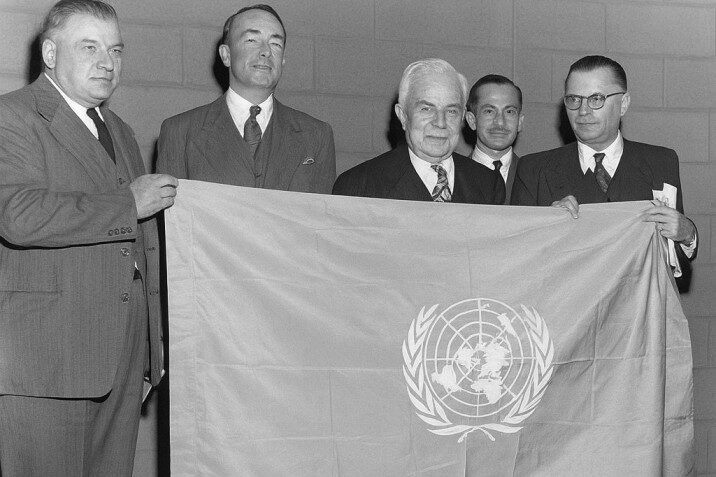It’s the spring of 1945. The newly formed United Nations is meeting in San Francisco. Delegates in tailored suits whisper in French and English, finalising the architecture of the post-war world order. Suddenly, an ageing Syrian with humble clothes and burning eyes walks calmly into the assembly.
He strides to the French seat, pulls out the chair, and sits down.
Gasps fill the hall.
The French ambassador arrives moments later, fuming. He demands the Syrian vacate his seat immediately.
The old man turns, looks him in the eye, and says:
“You are outraged I sit in your chair for five minutes. Imagine how Syrians feel after 25 years of your occupation.”
The entire assembly falls silent.
That man was Fares Al-Khoury (1877-1962) – the barefoot village boy who rose to become Syria’s Prime Minister, independence hero, and the very embodiment of Christian-Muslim unity.

Damascus Under Ottoman Shadows
But before San Francisco, before the United Nations, before independence speeches, there was a barefoot boy walking under the cold dawn light of the Anti-Lebanon mountains.
Back to the late 1800s.
It is still dark when the first Athan rises from Damascus’ mosques, echoing across silent courtyards. Inside small stone churches in Bab Touma, priests light candles before icons, their flames flickering like silent prayers. In the market alleys, the scent of stale ash mixes with early baked bread, while stray cats slink around shutters still locked in sleep.
Damascus is under Ottoman rule. The empire stretches from the Balkans to Yemen, and Syria is but one province under Istanbul’s fading power. Turkish soldiers in long wool coats patrol the streets with ceremonial rifles, stopping by vendors to demand coffee or inspect tax ledgers. Arabic is spoken in homes and markets, but official documents are in Ottoman Turkish. The courts, the army, the administration – all echo with Turkish phrases Syrians understand but never fully own.

👣 The Barefoot Scholar
In the mountain village of Kfeir in Lebanon, a boy named Fares wakes before sunrise. He wraps a thin cotton shawl around his shoulders to fight the dawn chill. His feet are rough from walking barefoot over gravel paths and olive tree roots. On his way to school, he pauses under an old olive, places a torn notebook on a flat stone, and recites poetry by heart as the first sun rays paint the hills gold.
His father, an Orthodox priest with a beard turning grey, has no land, no herds, and no wealth to leave him. But each morning, he whispers to his son:
“My son, knowledge is a fortress no army can conquer.”
How He Saw The Ottomans
From an early age, Fares saw the Ottomans with layered eyes. In the village, older men told tales of Ottoman sultans as guardians of Islam, protectors of Jerusalem and Mecca. Fares admired their scholars and the vast architecture of civilisation they preserved. But he also saw his father pay half his harvest in taxes, heard merchants complain of bribes demanded by Turkish officials, and watched Arab sheikhs excluded from councils that decided their own people’s fate.
He believed in reform within the empire. Like many Arab intellectuals of his generation, he hoped Syrians could gain a voice while preserving the empire’s unity. But after the Ottomans allied with Germany in World War I and imposed harsh wartime requisitions that starved entire villages, his hope turned to realism: the empire was collapsing, and freedom could no longer wait for gradual reform.
The University Years
At the American University of Beirut, Fares arrived with a bundle of clothes tied with rope, a single pair of shoes, and an unbreakable will to learn. He mastered Arabic, English, and French with ease. Professors remembered him as the student who would listen silently for an hour, then raise his hand and reframe the entire lecture in a single sentence that left the room in thoughtful silence.
He debated philosophy, Islamic history, Western political theory, and Arabic poetry with equal confidence. At night, he sat by lantern light under palm trees, reading Quranic tafseer to understand his Muslim classmates’ worldview. His Christian faith was unshakeable, but so was his curiosity to understand every culture around him.
From Scholar to Teacher
Returning to Damascus, he became a teacher at the Syrian Protestant College. His students adored him. He wore simple dark robes, carried his books tied with a cotton cloth, and walked to class without guards or servants. He never shouted. Instead, when students grew noisy, he fell silent and waited. Within seconds, the room calmed, eager to hear what his quiet voice would reveal that day.
He taught them that knowledge was power, but character was destiny.
Damascus Under French Rule

When the Ottoman Empire fell after World War I, French troops replaced Turkish garrisons in Damascus. At first, some Syrians cheered. The Turks were gone, and a modern Western ally had arrived. But hope soon faded. French soldiers built barracks in schools, installed foreign administrators, and declared Arabic subordinate to French in official documents.
In the streets, French officers strutted with leather boots and medals, while Syrians crossed to the other side to avoid confrontation. At night, coffee houses were filled with oud songs mourning the lost dream of freedom. Men whispered poetry about Omar Al-Mukhtar in Libya, Abd Al-Qadir in Algeria, and now… about the need for a Syrian hero.
Christian Leading a Muslim Nation
That hero emerged not with a rifle, but with quiet dignity and unbreakable logic.
When radicals questioned how a Christian could lead a Muslim-majority nation, Fares walked calmly into the Umayyad Mosque, removed his shoes, climbed the minbar, and called the Athan with flawless pronunciation. Worshippers fell silent, their hearts stunned. He turned and said:
“I am not your Imam. I am your brother, reminding you that this land is your prayer. Syria belongs to us all.”
That day, Muslim men and Christian priests wept together outside the mosque doors, feeling the weight of his words.
Achievements That Shaped A Nation

Fares Al-Khoury’s political career unfolded like a chess game against colonial power. He served as Minister of Education, Minister of Finance, Speaker of Parliament, and Prime Minister, known for incorruptible dignity and strategic brilliance. His calm, almost quiet speeches often dismantled French policies without ever raising his voice.
He co-founded the School of Law at Damascus University, building an institution that would train judges, lawyers, and future ministers who shaped Syria’s modern state.
He worked to ensure Muslim-Christian harmony, protecting Islamic studies in national schools while modernising legal education. Ramadan and Christmas were both celebrated as national seasons of unity.
The Speech That Won Independence
At the UN in 1945, when France declared Syria unready for freedom, Fares rose and spoke in flawless French:
💬 “France herself has known defeat, occupation, and humiliation in our lifetime. We sheltered your soldiers. Who dares say my people are unworthy of freedom?”
He paused, letting his words sink in. No anger. No raised fist. Just quiet moral force that pierced hypocrisy like a blade through silk.
Days later, under international pressure, France recognised Syria’s independence.
Fares Al-Khoury Square – A Living Memory
Today, if you walk through Damascus near Fares Al-Khoury Street, named in his honour, you will find traffic swirling endlessly, buses honking, and men selling tea from tin kettles on the pavement. Few stop to think about the barefoot boy from Kfeir who became Prime Minister. But if you pause for a moment, close your eyes, and listen past the noise, you might hear his quiet voice saying:
“Strength is not in armies or wealth. True strength is dignity, knowledge, and courage to stand alone for what is right.”
Why His Story Matters Today
Imagine Syria today remembering him not just as a name on a square, but as a leader who:
✔️ Refused sectarian division
✔️ Fought colonialism with words instead of weapons
✔️ Built institutions that still educate the nation
✔️ Showed the world that a Christian could lead a Muslim-majority country with love and respect
In an era of division and loud anger, Fares Al-Khoury teaches us that quiet dignity often shakes empires more than rage.
